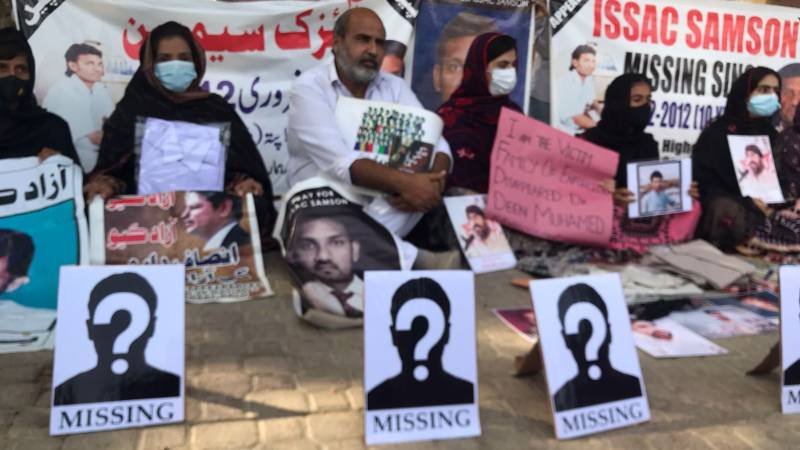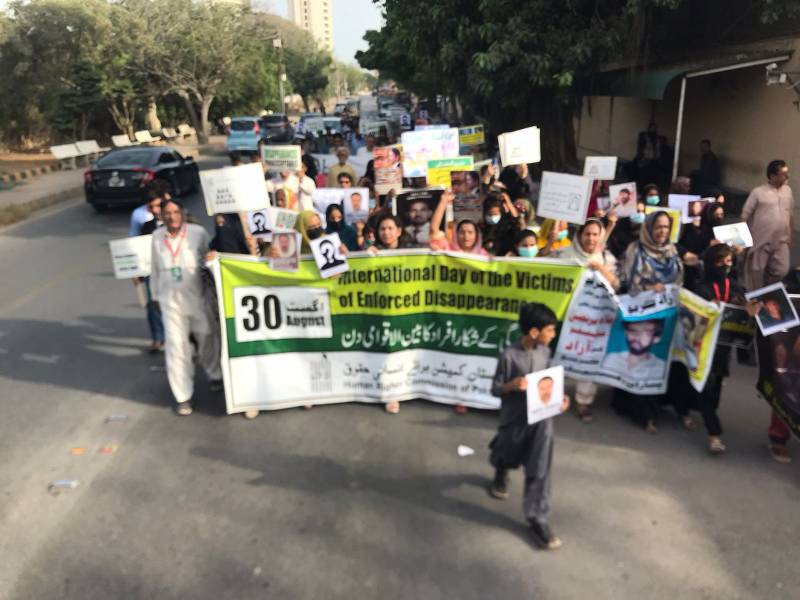
Fewer than 100 protesters gathered in Karachi on Wednesday afternoon to protest the enforced disappearance of people. But the protest had the state nervous as they turned out in force, armed with wooden batons.
The marchers primarily comprised women and children, families of the missing people. They had organized a rally from Frere Hall to the Karachi Press Club, where a sit-in was organized to mark the International Day of Enforced Disappearances. The event had been organized by the Human Rights Commission of Pakistan (HRCP) in collaboration with the Sindh Sujagi Forum, Baloch Yakjehti Committee, Voice of Baloch Missing Persons, Voice of Sindhi Missing Persons, Voice for Shia Missing Persons, and various student organizations on Wednesday.
The city administration had prepared for protestors who were advocating the recovery of their loved ones who had been missing for a long time. Their demand was straightforward: "If someone has committed a crime, they should be presented before the respective court. Enforced disappearances are not acceptable."

Sammi Din Baloch, whose father Dr Din Muhammad Baloch has been missing for the past 14 years, spoke passionately about the anguish families experience after the disappearance of their loved ones. She alleged that the state has continuously and systematically carried out forced disappearances, particularly in Balochistan, without acknowledgement.
Baloch further shed light on the harrowing treatment many undergo in captivity, including physical torture and post-mortem organ removal.
She stressed that anyone found guilty should face proper judicial procedures rather than be subjected to forced disappearances.
Sarang Joyo of the Sindh Sujagi Forum amplified this sentiment, urging people to raise their voices against such heinous acts.
He revealed that since 2005, the scale of enforced disappearances has surged, with many still missing from Sindh, including lawyers and activists.
Qazi Khizer, who represents HRCP Sindh, told the gathering that enforced disappearances have become an oppressive tool to curb political movements, and its frequency in the country is escalating alarmingly.
According to a report by the Commission of Inquiry on Enforced Disappearances, there have been 8,460 registered cases of enforced disappearance since 2011. Although the commission claims to have resolved 6,825 cases, there remain 2,210 unresolved cases.
The commission reviewed 758 cases, resolving 135. Out of these, 118 were traced, leading to 113 returnees, while in two cases, the missing persons were traced to internment centres or jails.
However, sceptics like Khizer believe the reported figures do not show the whole story and are just the tip of the iceberg.
He contends that the state is concealing the true extent of the crisis and emphasized the need for transparency and adherence to the rule of law.
"Enforced disappearances must end, and the state must be held accountable for its actions," he demanded.
Incoming elected govt urged to act on enforced disappearances
In a separate statement, the HRCP expressed grave concerns over the lack of progress in tracing victims and holding perpetrators accountable.
"Despite repeated calls for action from civil society, including victims' families, the state has failed to legislate against enforced disappearances," the statement read.
Viewing the upcoming general elections - whenever they are held - as an opportunity, the Commission said that if any incoming elected government is serious about upholding principles of justice and accountability, it cannot afford to drag its feet on this critical matter.
Speaking at a meeting in Islamabad, Council member and former senator Farhatullah Babar said that, despite creating a special cell at General Headquarters in July 2019, there had been no progress towards eliminating enforced disappearances.
Babar emphasised that repeated demands for victims' release and recovery had fallen on deaf ears, emanating from the high-powered cabinet, parliamentary committees, and the Peshawar High Court.
He reiterated the need for transparency and accountability, strongly urging the authorities to shut down extra-legal internment centres where many victims of enforced disappearance were allegedly held.
On the parliamentary side, Babar noted that constant political bickering over the enforced disappearances bill and its constant removal from the parliamentary agenda underscored the fecklessness of state stakeholders in making any progress on the issue.
At a meeting in Lahore, HRCP Chairperson Hina Jilani stressed the importance of defining and punishing the offence in line with international standards. She condemned the use of torture, extrajudicial killings and secret detentions, emphasising the need for a robust legal framework that protects civil liberties.
Jilani also raised strong concerns over the dismal performance of the Commission for Inquiry on Enforced Disappearances, emphasising that accountability must extend to those ordering or allowing such violations to occur. 'Claims of "neutrality" from those responsible', she added, 'stand exposed.'

